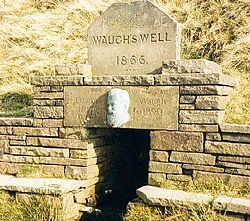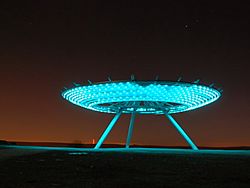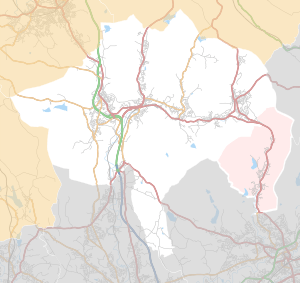Borough of Rossendale facts for kids
Quick facts for kids
Borough of Rossendale
|
|
|---|---|
|
Borough and non-metropolitan district
|
|
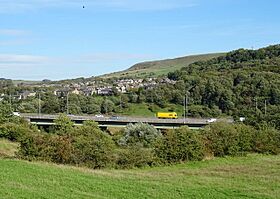
Rossendale Valley
|
|
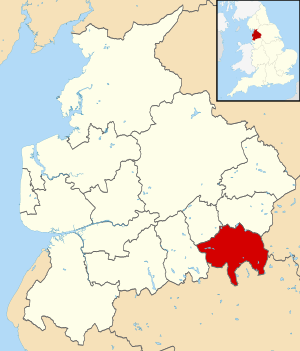
Rossendale shown within Lancashire and England
|
|
| Sovereign state | United Kingdom |
| Constituent country | England |
| Region | North West England |
| Ceremonial county | Lancashire |
| Admin. HQ | Bacup |
| Government | |
| • Type | Rossendale Borough Council |
| Area | |
| • Total | 53.3 sq mi (138.0 km2) |
| Area rank | 194th |
| Population
(2005 est.)
|
|
| • Total | 71,482 |
| • Rank | Ranked 296th |
| • Density | 1,341.6/sq mi (517.99/km2) |
| Ethnicity (2021) | |
| • Ethnic groups |
List
|
| Religion (2021) | |
| • Religion |
List
48.8% Christianity
40.1% no religion 5.2% not stated 4.9% Islam 0.5% other 0.3% Buddhism 0.1% Hinduism 0.1% Judaism 0.1% Sikhism |
| Time zone | UTC+0 (Greenwich Mean Time) |
| • Summer (DST) | UTC+1 (British Summer Time) |
| Postcode |
BB, BL, OL
|
| ONS code | 30UM (ONS) E07000125 (GSS) |
Rossendale is a local government area in Lancashire, England. It has a special "borough status". The main office for its council is in Bacup. The biggest town in Rossendale is Rawtenstall. Other towns in the borough include Haslingden and Whitworth. The area gets its name from the Rossendale Valley, which is where the upper part of the River Irwell flows.
Rossendale is surrounded by other areas like Burnley, Hyndburn, Blackburn with Darwen, Bury, Bolton and Calderdale.
Contents
What's in a Name?
The name Rossendale was first written down in 1292. An older record from 1242, Rocendal, suggests it comes from an old Celtic word ros, meaning "moor" or "heath". It also includes the Old Norse word dalr, which means "dale" or "valley". So, Rossendale means "moor valley", referring to the valley of the River Irwell.
A Look Back in Time
Rossendale is part of what was once called the Forest of Rossendale. This "forest" was a hunting area in medieval times. It has steep valleys carved by the River Irwell and its smaller rivers. These rivers flow south from the Pennines mountains towards Manchester.
Small towns grew in this area, especially during the late Middle Ages. People started farming and making wool products at home during the time of Henry VIII. But Rossendale's population really grew a lot during the Industrial Revolution. For example, in 1801, about 24,000 people lived here. By 1901, this number had jumped to nearly 90,000!
The wet weather in Rossendale was perfect for watermills. These mills later helped power machines for spinning wool and cotton in the 1700s and 1800s. This made Rossendale a very important place for the Industrial Revolution. It was even called 'The Golden Valley'. In the mid-1800s, a new industry started: making felt. From this, slipper making became a big job for many people in the area.
Rossendale is also famous for its stone quarries. Rossendale Flagstone was used all over the country in the 1800s. Did you know that the flagstones in Trafalgar Square in London came from Rossendale? Even today, some farming happens in the uplands, mostly sheep and cattle.
The history of Rossendale has been well-recorded by historians like Chris Aspin, who studied the textile industry, and Derek Pilkington. Pilkington helped save Higher Mill in Helmshore, which is now the Helmshore Mills Textile Museum.
The Whitworth Doctors were famous surgeons and bone setters in the late 1700s and early 1800s. People came from all over the country to be treated by them.
Today, you can find R.S. Ireland (The Real Lancashire Black Pudding Co.) near Haslingden. They are a family business that makes black pudding using old recipes from 1879. In Rawtenstall, there's Fitzpatricks Herbal Health. This is the last working temperance bar in England! They make and sell their own non-alcoholic drinks like sarsaparilla and black beer.
How the Borough Was Formed
The modern Rossendale district was created on April 1, 1974. This happened under a law called the Local Government Act 1972. It brought together several older districts:
- Bacup Municipal Borough
- Haslingden Municipal Borough
- Rawtenstall Municipal Borough
- Whitworth Urban District
- Part of Ramsbottom Urban District
The new district was named Rossendale because of the Rossendale Valley and the old medieval Forest of Rossendale. From the very beginning, it was given "borough status". This means the head of the council can be called the mayor.
How Rossendale is Governed
| Rossendale Borough Council | |
|---|---|
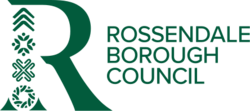 |
|
| Type | |
| Type |
Non-metropolitan district
|
| History | |
| Founded | 1 April 1974 |
| Leadership | |
|
Mayor
|
|
|
Leader
|
|
|
Rob Huntington
Since April 2023 |
|
| Structure | |
| Seats | 30 councillors |
|
Political groups
|
|
| Elections | |
| First past the post | |
|
Last election
|
2 May 2024 |
|
Next election
|
7 May 2026 |
| Meeting place | |
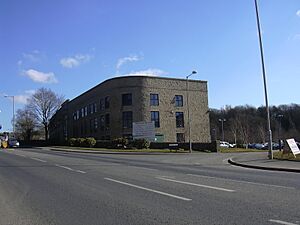 |
|
| The Business Centre, Futures Park, Bacup, OL13 0BB | |
The Rossendale Borough Council takes care of local services for the district. Things like bigger county-wide services are handled by Lancashire County Council. Whitworth is also a civil parish, which means it has its own local government layer.
Who Leads the Council?
In Rossendale, the mayor's job is mostly for ceremonies. The real political leader is the leader of the council. Here are the leaders since 2004:
| Councillor | Party | From | To | |
|---|---|---|---|---|
| Duncan Ruddick | Conservative | Dec 2004 | 19 Dec 2007 | |
| Tony Swain | Conservative | 19 Dec 2007 | 8 May 2011 | |
| Alyson Barnes | Labour | 20 May 2011 | ||
Council Members
After the 2024 election, the council looks like this:
| Party | Councillors | |
|---|---|---|
| Labour | 20 | |
| Conservative | 5 | |
| Green | 3 | |
| Community First | 2 | |
| Total | 30 | |
The next election for the council is planned for 2026.
How Elections Work
The council has 30 councillors. They represent 10 different areas called wards. Each ward elects three councillors. Elections happen three years out of every four. Each time, one-third of the council members are elected for a four-year term. In the fourth year, when there are no borough council elections, Lancashire County Council elections are held instead.
Council Buildings
The council's main office is at The Business Centre in Futures Park, Bacup. This building was first built in 2003 as commercial offices. The council moved some of its offices there and then created a council chamber in 2009. This helped them bring all their services to one place.
Before 2009, the council was based at Rawtenstall Town Hall. This building was originally built in 1876 as a club. The Rawtenstall Local Board (which was like an early council) bought it in 1890 to use as their offices.
Getting Around Rossendale
Rossendale is connected to other towns like Manchester, Burnley, and Blackburn by motorways. These include the A56/M65 and M66 motorways.
There used to be a train line going south to Manchester through Bury. But this line closed in 1966. However, part of the old railway line reopened in 1991 as the East Lancashire Railway. This is a special heritage railway run by volunteers. It runs from Rawtenstall to Bury, passing through Ramsbottom and Summerseat. In 2003, the line was extended further east to Heywood.
In 2015, there was a plan to bring back a regular train service between Rawtenstall, Bury, and Manchester. This would use the same route as the East Lancashire Heritage Railway.
Buses are a popular way to travel in the area. Services are mainly provided by Rosso and Burnley Bus Company. They offer regular routes to places like Burnley, Blackburn, Accrington, Bolton, Bury, Manchester, and Rochdale, as well as local towns.
Schools in Rossendale
Rossendale has several secondary schools for students:
- All Saints' Catholic High School
- Alder Grange School
- Bacup and Rawtenstall Grammar School (a selective state school)
- Haslingden High School
- The Valley Leadership Academy
- Whitworth Community High School
- Rossendale School (a special school for autism)
There is also Accrington and Rossendale College, which is located in Accrington.
Media in Rossendale
For television, people in Rossendale can watch BBC North West and ITV Granada. These signals come from the Winter Hill TV transmitter.
Local radio stations include BBC Radio Lancashire (95.5 FM), Heart North West (105.4 FM), Capital Manchester and Lancashire (107.0 FM), Greatest Hits Radio Lancashire (96.5 FM), and Rossendale Radio (104.7 FM). Rossendale Radio is a community station that broadcasts from Rawtenstall.
The local newspaper for the area is the Lancashire Telegraph.
Arts and Culture in Rossendale
Rossendale is home to many artists. You can find several painters' studios, especially around Waterfoot. Bacup has Rossendale's only traditional theatre, The Royal Court Theatre, which opened in 1893. It has a busy Youth Theatre called The Rossendale Musical Theatre Academy.
There's also an arts centre called 'The Boo'. It hosts family theatre shows, music, and community arts events. It's also the home of the Horse and Bamboo Theatre Company, known for their visual theatre with unique puppets and masks. Many local artists and groups, like Globe Arts and Valley Artists, open their studios each year for the Rossendale Art Trail Open Studios weekend.
The first part of the Irwell Sculpture Trail starts above Bacup, at Deerplay, and goes to Stubbins. Famous people from Rossendale include actress Jane Horrocks (born in Rawtenstall), composer Alan Rawsthorne (born in Haslingden), and fashion designer Betty Jackson (from Bacup).
In the 1700s and 1800s, a special group of working-class musicians called the Larks of Dean played music at the Baptist Chapel in Goodshaw Fold. Rossendale also has a strong brass band tradition. There used to be over 40 bands! Today, there are still many, like the Haslingden and Helmshore Band and the Whitworth Vale & Healey Band.
Rossendale is also home to a unique dance group, the Britannia Coconut Dancers. They formed in the mid-1800s and traditionally dance along local roads every Easter.
There's a long history of dialect poetry and writing in Rossendale. Poets like Andrew Houston (The Rossendale Bard) wrote about the area. Waugh's Well, near Edenfield and Cowpe, is a place where poet Edwin Waugh wrote many of his poems. It's a popular spot for walkers.
The Halo is a large artwork, 18 meters wide, made of steel. It sits on a tripod overlooking Haslingden. It's easy to see from the M66 and A56 roads. At night, it lights up with energy-saving LEDs powered by a nearby wind turbine. It's one of the "Panopticons" in Lancashire, which are artworks that offer great views. The Halo opened in September 2007.
Rossendale is also home to Hard Graft, a touring theatre company started in 1999. They are known for performing in unusual places, like living rooms and charity shops!
Sports and Fun
Three towns in Rossendale have cricket clubs that play in the Lancashire League: Bacup, Haslingden, and Rawtenstall. Famous international cricket players have often lived in the Rossendale Valley because of this.
Rossendale rugby club has grown a lot recently. They used to be a small club but have now moved up to higher leagues.
The area's main semi-professional football team is Bacup Borough F.C.. They play their home games at West View. Another local team, Rossendale United, unfortunately closed down in 2011. Ramsbottom United is another semi-pro team from the area.
Rossendale has also been featured in TV shows. The comedy series The League of Gentlemen is thought to be based on Rossendale, making fun of stereotypes of the area. Parts of the show were even filmed in Bacup. The BBC drama Hetty Wainthropp Investigates and Juliet Bravo were also filmed in Rossendale. In 2008, parts of the BBC series Survivors were filmed here too.
Rossendale Radio, a local radio station, broadcasts throughout the valley. The Rossendale Male Voice Choir, a singing group, was formed in the valley in 1924.
Towns and Villages
In 2001, about 65,652 people lived in Rossendale. This population was spread across the towns of Bacup, Haslingden, Whitworth, and Rawtenstall. It also included villages like Crawshawbooth, Edenfield, Helmshore, and Waterfoot, plus many smaller places. By the 2011 Census, the population had grown to 67,922.
Built-Up Areas
Much of Rossendale is part of a larger built-up area that includes Accrington. This area stretches from Rawtenstall and Bacup to Accrington. In total, this urban area had a population of 125,059 people.
Local Parishes
Whitworth is the only civil parish in Rossendale. Its parish council has decided that the parish should be called a "town". The rest of the borough does not have these smaller parish councils.
Famous People from Rossendale
- Agyness Deyn – a model
- Natalie Casey – actress and presenter (from Hollyoaks)
- Jane Horrocks – actress
- Ted Robbins – actor and comedian (from Phoenix Nights)
- William Roache – actor
- Phil Neville – former footballer (Everton)
- Sam Aston – actor (from Coronation Street)
- Jennie McAlpine – actress (from Coronation Street)
- Andy Kershaw – DJ and reporter
- Liz Kershaw – DJ
- Karl Burns – punk drummer from the Fall
- David Trippier – a former government minister
- Michael Carr – a former Member of Parliament (MP)
- Frankee Connolly – member of the music duo Mini Viva
- Phil Lester – YouTuber, author, and former BBC Radio 1 presenter
- Chris Allen – lead singer of the Troggs
- Lee Cartwright – former footballer
Twin Town
Rossendale Borough Council is twinned with:
See also
 In Spanish: Rossendale para niños
In Spanish: Rossendale para niños
 | Dorothy Vaughan |
 | Charles Henry Turner |
 | Hildrus Poindexter |
 | Henry Cecil McBay |


